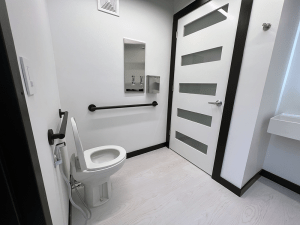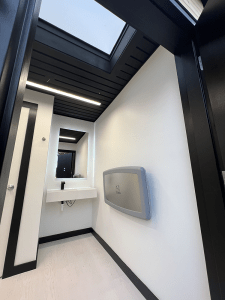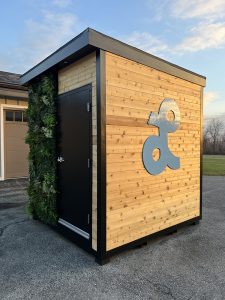Looie looks to create more bathroom access
When you’ve gotta go, you’ve gotta go. And for people with a spinal-cord injury or disease (SCI/D), finding a clean, convenient and accessible restroom in a public place can be difficult. Many times, people will avoid going out altogether simply to avoid the inconvenience.
But a startup company showcasing its product at the mega consumer technology event called CES in Las Vegas this week is aiming to make the experience easier, cleaner — and more accessible.
Looie, based in Providence, R.I., bills itself as an upscale option to a portable toilet. Each self-contained, 8-by-8-foot unit is loaded with high-end features and is Americans with Disabilities Act (ADA) compliant.
Founder and CEO Cutler Whitely, who has a background in biotechnology, started the company about a year ago in response to a lack of public restrooms when he was traveling with his family. Specifically, he says he found out Manhattan in New York has only about 1,000 permanent restrooms for public usage, meaning they’re not located inside a restaurant or other business.

“There are actually people who approach me with various conditions that either, you know, they were trying to find restrooms that were ADA accessible or they happen to use the restroom more than the average person,” Whitely says. “And so, they are like, ‘One of my biggest problems is when I go out, I don’t know where the restrooms are and when I get there, it’s very uncomfortable. I don’t feel like I’m in a private setting. And so, now, it’s like kind of strange for me to use this.’ And so, we decided to make this. And that doubled for everything else, too, because people were also looking safety and privacy … the conditions for a restroom shouldn’t be so bad that nobody uses them.”
Whitely says it took about six months to design the restrooms and the ADA guidelines were fairly easy to integrate.
“We call it luxury, but I think there’s a better word than luxury. It’s more like what everybody honestly deserves,” Whitely says.
The semi-permanent units are compact enough to fit in a parallel parking space. Users will be able to download the Looie app to locate the closest facility and then use the integrated Brivo lock system to scan their smartphone and gain access. Once inside, users will find a temperature-controlled environment with a 68-inch wheelchair turning radius, grab bars, a roll-under sink, a lowered towel dispenser, complimentary hygiene products and a baby changing table.
In addition, the restroom is made with eco-friendly materials, including a cedar exterior and a biowall that can be customized to the location and can be easily replaced if damaged. It also uses an onboard tank system for fresh water and black water storage — meaning no chemicals and no smell. Whitely has plans to make it even more eco-friendly by adding solar panels in the future.
The Looie app also allows users to indicate that they have a qualifying disability, which means they won’t have to pay the 99-cent fee to use the restroom. For those without a disability, Whitely says the fee is 99 cents for the first 10 minutes and increases after 20 minutes. He says this was done to discourage people from living inside the restroom. The company can also remotely lock and unlock the doors depending on what time the city or event wants them to close and open.

“We hold feedback and input from our partners and users in high regard as we diligently work on iterating and making essential enhancements to boost the functionality and accessibility of the Looie,” Whitely says.
While the company is still in the early stages and currently has just two restrooms built as minimum viable products, Whitely says they are actively seeking opportunities to bring the Looie to events and venues that align with their mission. In addition to placing the commodes on public streets across the nation, the company’s vision includes leasing the restrooms to larger events such as weddings, festivals or concerts as part of a VIP ticket package. The cost to lease a Looie is $500 a day or $2,500 a month for longer-term leases, such as peak tourism seasons.
“We’re not just a bathroom. We’re elevating the whole experience, which we desperately need, unfortunately. And it’s really hard to find,” Whitely says. “We don’t want small businesses to be in charge of cleaning their bathrooms to the public. Like, that shouldn’t be their job. We want it to be our job.”
For more information on the Looie, visit looie.app.



